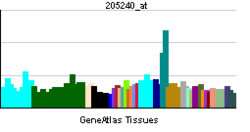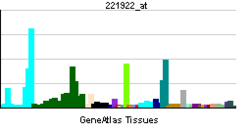GPSM2
| G-protein signaling modulator 2 | |||||||||||||
|---|---|---|---|---|---|---|---|---|---|---|---|---|---|
| |||||||||||||
| Identifiers | |||||||||||||
| Symbols | GPSM2 ; CMCS; DFNB82; LGN; PINS | ||||||||||||
| External IDs | OMIM: 609245 MGI: 1923373 HomoloGene: 56584 GeneCards: GPSM2 Gene | ||||||||||||
| |||||||||||||
| RNA expression pattern | |||||||||||||
 | |||||||||||||
 | |||||||||||||
| More reference expression data | |||||||||||||
| Orthologs | |||||||||||||
| Species | Human | Mouse | |||||||||||
| Entrez | 29899 | 76123 | |||||||||||
| Ensembl | ENSG00000121957 | ENSMUSG00000027883 | |||||||||||
| UniProt | P81274 | Q8VDU0 | |||||||||||
| RefSeq (mRNA) | NM_013296 | NM_029522 | |||||||||||
| RefSeq (protein) | NP_037428 | NP_083798 | |||||||||||
| Location (UCSC) | Chr 1: 109.42 – 109.48 Mb | Chr 3: 108.68 – 108.72 Mb | |||||||||||
| PubMed search | |||||||||||||
G-protein-signaling modulator 2, also called LGN for its 10 Leucine-Glycine-Asparagine repeats, is a protein that in humans is encoded by the GPSM2 gene.[1][2][3]
Function
Heterotrimeric G proteins transduce extracellular signals received by cell surface receptors into integrated cellular responses. GPSM2 belongs to a group of proteins that modulate activation of G proteins (Blumer et al., 2002).[supplied by OMIM][3]
Interactions
GPSM2 has been shown to interact with Nuclear mitotic apparatus protein 1[4] and GNAI2.[2][5]
References
- ↑ Blumer JB, Chandler LJ, Lanier SM (Apr 2002). "Expression analysis and subcellular distribution of the two G-protein regulators AGS3 and LGN indicate distinct functionality. Localization of LGN to the midbody during cytokinesis". J. Biol. Chem. 277 (18): 15897–903. doi:10.1074/jbc.M112185200. PMID 11832491.
- ↑ 2.0 2.1 Mochizuki N, Cho G, Wen B, Insel PA (Jan 1997). "Identification and cDNA cloning of a novel human mosaic protein, LGN, based on interaction with G alpha i2". Gene 181 (1-2): 39–43. doi:10.1016/S0378-1119(96)00456-8. PMID 8973305. Check date values in:
|year= / |date= mismatch(help) - ↑ 3.0 3.1 "Entrez Gene: GPSM2 G-protein signalling modulator 2 (AGS3-like, C. elegans)".
- ↑ Du Q, Stukenberg PT, Macara IG (Dec 2001). "A mammalian Partner of inscuteable binds NuMA and regulates mitotic spindle organization". Nat. Cell Biol. 3 (12): 1069–75. doi:10.1038/ncb1201-1069. PMID 11781568.
- ↑ Marty C, Browning DD, Ye RD (Jun 2003). "Identification of tetratricopeptide repeat 1 as an adaptor protein that interacts with heterotrimeric G proteins and the small GTPase Ras". Mol. Cell. Biol. 23 (11): 3847–58. doi:10.1128/MCB.23.11.3847-3858.2003. PMC 155206. PMID 12748287.
Further reading
- Du Q, Stukenberg PT, Macara IG (2001). "A mammalian Partner of inscuteable binds NuMA and regulates mitotic spindle organization". Nat. Cell Biol. 3 (12): 1069–75. doi:10.1038/ncb1201-1069. PMID 11781568.
- Marty C, Browning DD, Ye RD (2003). "Identification of tetratricopeptide repeat 1 as an adaptor protein that interacts with heterotrimeric G proteins and the small GTPase Ras". Mol. Cell. Biol. 23 (11): 3847–58. doi:10.1128/MCB.23.11.3847-3858.2003. PMC 155206. PMID 12748287.
- Kaushik R, Yu F, Chia W, Yang X, Bahri S (2003). "Subcellular localization of LGN during mitosis: evidence for its cortical localization in mitotic cell culture systems and its requirement for normal cell cycle progression". Mol. Biol. Cell 14 (8): 3144–55. doi:10.1091/mbc.E03-04-0212. PMC 181556. PMID 12925752.
- Du Q, Macara IG (2004). "Mammalian Pins is a conformational switch that links NuMA to heterotrimeric G proteins". Cell 119 (4): 503–16. doi:10.1016/j.cell.2004.10.028. PMID 15537540.
- Yasumi M, Sakisaka T, Hoshino T, Kimura T, Sakamoto Y, Yamanaka T et al. (2005). "Direct binding of Lgl2 to LGN during mitosis and its requirement for normal cell division". J. Biol. Chem. 280 (8): 6761–5. doi:10.1074/jbc.C400440200. PMID 15632202.
- Yang J, Kamide K, Kokubo Y, Takiuchi S, Tanaka C, Banno M et al. (2005). "Genetic variations of regulator of G-protein signaling 2 in hypertensive patients and in the general population". J. Hypertens. 23 (8): 1497–505. doi:10.1097/01.hjh.0000174606.41651.ae. PMID 16003176.
- Izaki T, Kamakura S, Kohjima M, Sumimoto H (2006). "Two forms of human Inscuteable-related protein that links Par3 to the Pins homologues LGN and AGS3". Biochem. Biophys. Res. Commun. 341 (4): 1001–6. doi:10.1016/j.bbrc.2006.01.050. PMID 16458856.